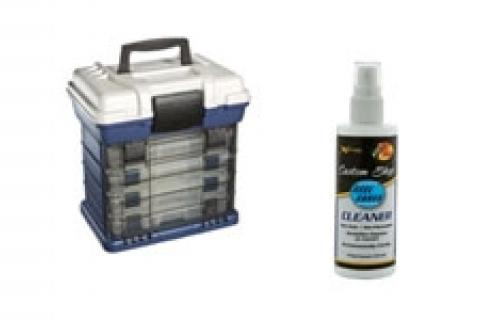
In recent years, for many anglers fishing has become a year-round activity. So what if it's winter out. So what if its threatening snow and ice freezes in your rod guides and beard and your coffee gets cold the minute you pour it.
If there's a fish to be caught, or even a chance one might be caught, these intrepid anglers are out there.
On the other hand, if you're a more casual, fair-weather angler, you might want to take a look at your tackle now, before you break it out later this spring.
If you're like most people, wherever you happened to stash your tackle after the final fishing outing late last fall is where it will remain. Chances are it will stay there, untouched, until the first warm day in spring when you decide it's time to hit the water again.
If you want to be totally ready to go for next season, though, with your tackle organized, clean and in perfect shape, now is the time to repair, refurbish and perform needed maintenance chores. Rods, reels, lines and lures all need attention.
 |
| Large tackle boxes are one good way to organize and keep tackle safe. |
Besides the aggravation disorganized, broken or misplaced gear can cause on that first day on the water, neglecting your tackle can also cost you fish. This can come from a broken lure, damaged rod, frayed line or simply time lost finding and repairing things out on the water when you could be casting and catching fish.
Instead of facing this scenario, take time now to perform the necessary maintenance on your angling gear. Here are the most important projects and tackle chores to attend to. You can probably think of others, but these are the basics.
Fishing Rods & Fishing Poles. These should be thoroughly cleaned at the end of the season. Wash them from tip to butt, using a hose or washing them in the shower. Scrub guides and the handle with a brush.
If the handle is cork and has become a bit grimy with the long season of use, scrub it with an abrasive sponge and a household cleanser before rinsing with water. If this still doesn't clean it thoroughly, use a very fine grade sandpaper to remove the outer dirty film. Don't rub too hard, though, or you might remove too much cork.
Check to see if any rod guides or the rod tip are loose or need replacing. Sometimes they can become bent or have grooves in them that can weaken line as it runs through. Check with a piece of nylon stocking to see if it catches.
Replace any damaged guides and re-wrap with thread, applying epoxy coats to bind them in place. You may find a guide doesn't need replacing, but simply an extra coat of epoxy on the wrappings to refurbish it for another season.
Fishing Reels. The first thing to do is loosen the drag on both spinning and casting reels. The next step is cleaning. Wash reels to remove silt, mud and weeds with a hose or in the sink. If you use a hose, don't turn it on high pressure, but simply a light flow with no nozzle. Use an old toothbrush to scrub the reel thoroughly. Rinse it, shake out as much excess water as you can, then let the reel air dry.
Oil and grease the reel according to the instructions that came with it. Take the reel apart for this project on a plain light colored surface and neatly place the screws and other parts in order to the side so reassembly will be easy and straightforward.
If you just put your line on recently, it likely will still be okay for use next spring. This is provided you store it inside and out of sunlight. If it has been on the reel a while, strip it off and replace with fresh line.
Fishing Lures. The first main task is reorganizing lures. Whether you have a modular system with each type of lure in its own box or one or two large fishing tackle boxes, replace each lure in its appropriate tray.
While you're at it, this is a good time to clip off little bits of line left on the lure and straighten line-tie eyelets if needed. Clean any lures that are dirty. Rinse in the sink or scrub with a sponge or paper towel and household cleanser if needed, then rinse clean. Separate any lures that look like they might not run right for testing later or discarding.
Taking care of these maintenance chores now will mean more time for actual fishing when that first trip rolls around, which won't be far away now.
- 3290 views

